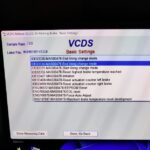A 2010 Volkswagen Passat with over 100,000 miles was purchased for $1,000. The previous owner disclosed occasional harsh shifting. After a few weeks, the harsh shifting persisted, along with difficulty engaging reverse. A VCDS scan revealed a P0868 fault code (Transmission Fluid Pressure Adaptation at Limit). Following a DSG recalibration using Ross-Tech’s guide, significant transmission problems arose, including the gear position indicator disappearing and various shifting issues. A subsequent scan showed fault codes P1820 (Pressure Control Valve 2) and P1815 (Pressure Control Valve 1), alongside the existing issues. This article will detail the symptoms, diagnostic process, and potential solutions related to the Vcds P1820 fault code.
Understanding VCDS P1820
The vcds p1820 fault code signifies a problem with Pressure Control Valve 2 in the DSG transmission. This valve, also known as N215, regulates hydraulic pressure within the mechatronic unit to control gear changes. A “Short to Plus” designation suggests an electrical fault in the valve’s circuitry. This could be due to a faulty solenoid, wiring harness issue, or a problem within the transmission control module (TCM). Simultaneously, the P1815 code points to a similar issue with Pressure Control Valve 1 (N216). These codes often appear together and indicate a potential need for solenoid replacement or further electrical diagnosis.
Symptoms Associated with VCDS P1820
The Passat exhibited a range of symptoms, worsening after the DSG recalibration. Initial issues included harsh shifting and difficulty engaging reverse. Post-calibration, the car experienced:
- Reverse Gear Problems: Difficulty engaging reverse, accompanied by whining noises.
- Gear Indicator Failure: The gear position indicator on the dashboard frequently disappeared.
- Abnormal Shifting: Slipping, chattering, and clunking during shifts, particularly from 1st to 2nd and into 3rd and 4th gears. The issues were more pronounced under load at low speeds.
- Limp Mode: The car occasionally got stuck in 1st gear, refusing to shift.
These symptoms collectively point to a serious malfunction within the DSG transmission’s mechatronic unit, likely related to the faulty pressure control valves indicated by the vcds p1820 and P1815 fault codes.
Diagnosing and Addressing VCDS P1820
The following steps are recommended for diagnosing and addressing the vcds p1820 fault code:
- Fluid and Filter Change: Though a fluid and filter change was planned, it is unlikely to resolve electrical faults related to the pressure control valves. However, it’s a crucial maintenance step for DSG transmissions and should be performed.
- Solenoid Testing: Testing the resistance of the N215 and N216 solenoids is crucial. Values outside the specified range confirm a faulty solenoid. This can be done using a multimeter and consulting the vehicle’s wiring diagram.
- Wiring Harness Inspection: Thoroughly inspect the wiring harness connecting the solenoids to the TCM for damage, corrosion, or loose connections.
- TCM Check: If solenoid and wiring harness checks are inconclusive, the TCM itself might be faulty. Further diagnostics with specialized equipment might be necessary.
- Solenoid Replacement: If testing confirms faulty solenoids, replacing them is the next logical step. This often involves removing the mechatronic unit from the transmission.
- Professional Help: If the problem persists after these steps, consult a qualified VW specialist or transmission technician for advanced diagnostics and repair.
Conclusion
The vcds p1820 fault code, combined with other symptoms and fault codes, indicates a significant problem with the DSG transmission in this VW Passat. While a fluid and filter change is a good starting point, it’s essential to systematically diagnose and address the electrical faults related to the pressure control solenoids and their associated circuitry. This may involve testing and replacing solenoids, inspecting the wiring harness, or potentially dealing with a faulty TCM. If the problem persists, seeking professional help from a VW specialist is highly recommended to ensure a proper diagnosis and repair.

